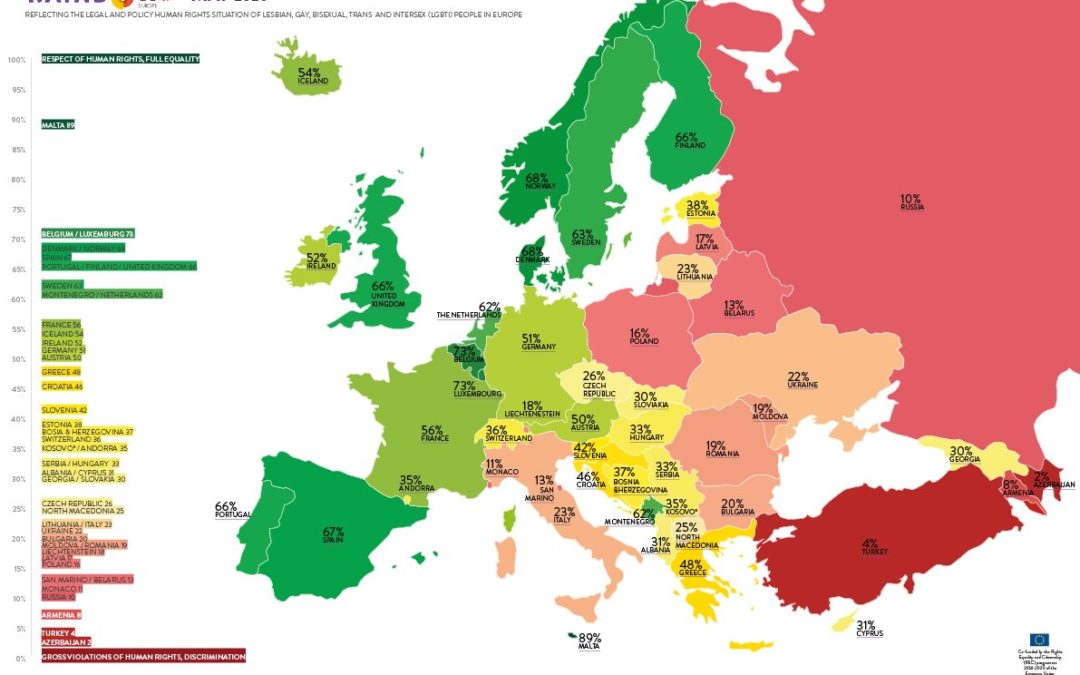Poland is the worst country in the European Union for LGBT people, according to the annual “Rainbow Map” produced by ILGA-Europe, a Brussels-based NGO that advocates for the rights of LGBT people.
The ranking takes into account both the legal situation for LGBT people and also the “social climate” they face. Poland was ranked second-worst in last year’s index, but has now fallen past Latvia into bottom place, following a year in which the Polish ruling party and church led a vocal anti-LGBT campaign.
In Europe as a whole, Poland is placed 42nd out of 49 countries, with only non-EU member states, such as Russia (10%), Turkey (4%) and last-place Azerbaijan (2%) being given a lower score by ILGA-Europe than Poland’s 16%. The ranking is topped by Malta (89%), followed by Belgium and Luxembourg (73%), and Norway and Denmark (68%).
In its annual report for Poland, ILGA-Europe noted “hateful rhetoric from the government and the church” against LGBT people, as well as violence against equality marches. A pride parade in Białystok was “brutally attacked” by extremists throwing smoke bombs and bottles, while in Lublin two protesters brought a home-made explosive device.
The leader of the ruling Law and Justice (PiS) party, Jarosław Kaczyński, declared that Poland must “defend children and normal families” from the “imported LGBT movement”, which “threatens our identity, our nation, its continued existence, and therefore the Polish state”. The Archishop of Kraków, Marek Jędraszewski, called “LGBT ideology” a “rainbow plague” and likened it to Bolshevism and Nazism.
Many local authorities (mostly under the control of PiS) have declared themselves “free from LGBT ideology”, a conservative newspaper distributed “LGBT-free zone” stickers, and the PiS governor of Lublin Province awarded medals to citizens who opposed “LGBT ideology”. In December, the European Parliament adopted a resolution condemning discrimination against LGBT people in Poland.
ILGA-Europe also noted that the education superintendent in the Małopolska Province, Barbara Nowak, has linked homosexuality with paedophilia and strongly opposed the annual “Rainbow Friday” initiative in support of LGBT rights in schools.
The report also noted legal difficulties for LGBT people in Poland, including same-sex parents being unable to have birth certificates transcribed into the Polish civil registry and the courts ruling in favour of an employee who had refused service to an LGBT customer.
The report also noted some positive developments, including a record 24 pride marches in Poland last year and the fact that courts overturned attempts to ban marches in a number of cities. Most such attempted bans were carried out by mayors associated with the main centrist opposition, Civic Platform (PO).
In order for Poland to improve the situation for LGBT people, ILGA-Europe recommends that it pass legislation granting recognition and rights to same-sex couples, that it expand hate crime laws to include those motivated by sexual orientation and gender identity, and that it ensure LGBT groups and activists have freedom of assembly and are not at risk.
Opinion polls indicate that a growing majority of the public support introduction of the right to same-sex civil partnerships, with the figure reaching 60% last year. President Andrzej Duda, a conservative ally of PiS, has indicated that he would be willing to sign such legislation into law.
Main image credit: ILGA-Europe

Daniel Tilles is editor-in-chief of Notes from Poland. He has written on Polish affairs for a wide range of publications, including Foreign Policy, POLITICO Europe, EUobserver and Dziennik Gazeta Prawna.




















